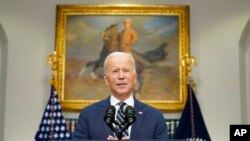U.S. President Joe Biden warned of the potential for Russia to carry out cyberattacks against U.S. interests or deploy biological or chemical weapons in Ukraine as Russia's Ukrainian invasion nears the one-month point.
Biden told a group of U.S. business leaders late Monday that Russian President Vladimir Putin did not anticipate the extent of unity he would face in opposition to Russia's actions and that "his back is against the wall."
"Now he's talking about new false flags he's setting up, including he's asserting that, we, in America, have biological as well as chemical weapons in Europe — simply not true," Biden said. "They're also suggesting that Ukraine has biological and chemical weapons in Ukraine. That’s a clear sign he is considering using both of those."
Biden also said Monday there was "evolving intelligence" that the Russian government was "exploring options for potential cyberattacks" against the U.S. in response to U.S. sanctions, and he urged the private sector to "immediately" harden "cyber defenses."
Russia rejected Biden’s warning, with Kremlin spokesman Dmitry Peskov telling reporters Tuesday that Russia “does not engage in state-level banditry.”
The leaders of the United States, France, Germany, Italy and Britain held a call Monday in which they discussed concerns about Russia's brutal tactics in Ukraine, underscored their continued support to Ukraine by providing security and humanitarian assistance, and reviewed recent diplomatic efforts in support of Ukraine's effort to reach a cease-fire, according to the White House.
Later this week, Biden will attend a NATO summit, a G-7 meeting, and a European Council summit in Brussels, all focused on the situation in Ukraine, before traveling to Poland.
Negotiations
Peskov said Tuesday that Russia would like to see “active and substantive” talks with Ukraine.
Ukrainian President Volodymyr Zelenskyy told local television Monday that he is prepared to discuss a range of issues with Putin, including a commitment for Ukraine to not join NATO, as part of efforts to achieve a cease-fire.
“It’s a compromise for everyone: for the West, which doesn’t know what to do with us with regard to NATO, for Ukraine, which wants security guarantees, and for Russia, which doesn’t want further NATO expansion,” Zelenskyy said.
He said earlier that the Ukrainian people would have to vote in a referendum on any compromises reached with Russia to end the war.
War crimes
The Pentagon on Monday accused Russian forces of committing war crimes in Ukraine.
"We certainly see clear evidence that Russian forces are committing war crimes, and we are helping with the collecting of evidence of that," Pentagon press secretary John Kirby told reporters in response to a question by VOA.
Kirby also accused Russian forces of carrying out "indiscriminate attacks on civilians" that were "intentional" in many cases.
He said the United States would wait for ongoing investigative processes and contribute to those investigations into Russian war crimes.
In Moscow, Russia's Foreign Ministry said Monday it had summoned U.S. Ambassador John Sullivan, citing "unacceptable statements" by U.S. President Joe Biden about Russian President Vladimir Putin, an apparent reference to Biden calling the Russian leader a "war criminal" last week.
"Such statements from the American president, unworthy of a statesman of such high rank, put Russian-American relations on the verge of rupture," it said.
Ukraine's allies are continuing to supply Ukrainian fighters through ground shipments of weapons that have not been attacked, a senior U.S. defense official said Monday. Ukrainians still have more than 90% of their combat power after nearly four weeks of fighting, the official said, in part because the United States and other allies have replenished them "in real time."
A senior U.S. defense official said Russian forces are still about 15 kilometers northwest of the Ukrainian capital, Kyiv.
"They haven't achieved anything in terms of what we assessed to be their objectives, which was population centers so that they could occupy and take over Ukraine," the official added, calling recent actions targeting civilians a "near-desperate attempt by the Russians to gain some momentum."
Humanitarian crisis
The U.N. refugee agency said Tuesday the number of refugees who have fled Ukraine since the Russian invasion began surpassed 3.5 million people.
More than 2.1 million of the refugees have gone to Poland, 543,000 to Romania, 368,000 to Moldova and 318,000 to Hungary.
This week, the U.N. General Assembly is expected to resume an "emergency special session" to vote on a draft resolution prepared by France and Mexico demanding an immediate stop to Russia's hostilities against Ukraine, especially attacks on civilians and civilian infrastructure.
The text also demands the full protection of civilians — including humanitarians, medical personnel, journalists and foreign nationals — and people trying to flee the conflict.
Pentagon correspondent Carla Babb and U.N. correspondent Margaret Besheer contributed to this report.
Some information came from The Associated Press, Agence France-Presse and Reuters.




